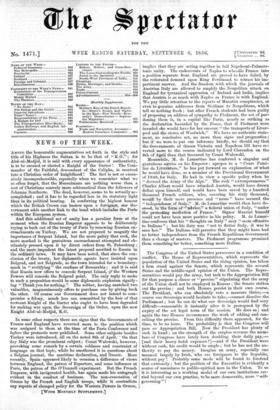The Congress of the United States perseveres in a condition
of conflict. The House of Representatives, which represents the' population of the United States and the rising opinion, has taken a firm stand against the Senate, which represents the several States and the middle-aged opinion of the Union. The Repre- sentatives would pay the army, but tack to the Appropriation Bill for that purpose a clause or " proviso " stipulating that the army of the Unionshall not be employed in Kansas : the Senate strikes out the proviso ; and both Houses persist in their own course. The President, who can absolutely veto a measure thrice,—a course our Sovereign would hesitate to take,—cannot dissolve the Parliament ; but he can do what our Sovereign would find very difficult—reassemble it instantly after it is prorogued by the expiry of the set legal term of the session. He does so ; and again 'the two Houses recommence the work of adding and can- celling the proviso. From this difficulty there appeared, for the time, to be no issue. The probability is that the Congress will pass no Appropriation Bill. Now the President has plenty of cash in hand ; on the strength of the surplus revenue the mem- bers of Congress have lately been doubling their daily pay,— [and their heavy hotel expenses ?]—and if the President were without cash, his credit would be ample ; but he has not the au- thority to pay the money. Imagine an army, especially one manned largely by Irish, who are foreigners to- the Republic, without pay ! Probably some mode will be found to forefend that extremity ; but the position of the Executive is evidently a source of uneasiness to public-spirited men in the Union. To us it is interesting as a working model of our own institutions car- ried beyond our own practice, to be more democratic, more " self- governing " !


































